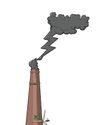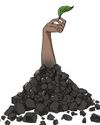
THE CLIMATE-FOCUSSED trade measures introduced by the US and European countries in recent months mark a huge reversal of their approach to global trade governance. In the past three decades, these rich countries have often joined forces through the World Trade Organization (WTO) and tried to knock down trade barriers and encourage countries to treat one another's products equally to boost global commerce and, in their estimation, to bring about stability of the global economy.
To understand this dynamic, you have to view how the free trade regime came about, says Sunita Narain, director-general of the Centre for Science and Environment (CSE), Delhi. In the 1990s, the rich world found that it would be cheaper for its industries to set up shop in parts of the world, like in China, where labour was cheap, labour conditions were weak and environmental safeguards could be ignored. As a result, the rich world "exported" their emissions to the balance sheet of "other" countries and continued to consume goods at cheaper rates, while not reducing their domestic emissions, Narain explains.
According to Sanjay Reddy, chair of the Department of Economics at the New School for Social Research, US, measures like CBAM are being imposed in an already uneven context, due to the prior failure of rich countries to make good on their promises to make green technologies more accessible to developing countries through extending knowledge or providing financing. One way to implement such compensation would be, suggests Reddy, to operationalise cbam but to remit all of the taxes collected to exporting countries, which could then choose to transfer some of these funds to affected industries and firms as grants to aid in the implementation of clean technologies.
This story is from the {{IssueName}} edition of {{MagazineName}}.
Start your 7-day Magzter GOLD free trial to access thousands of curated premium stories, and 9,000+ magazines and newspapers.
Already a subscriber ? Sign In
This story is from the {{IssueName}} edition of {{MagazineName}}.
Start your 7-day Magzter GOLD free trial to access thousands of curated premium stories, and 9,000+ magazines and newspapers.
Already a subscriber? Sign In

On shaky ground
Despite reporting net gains in green cover, the latest forest survey shows degradation of natural forests, particularly in ecologically sensitive hotspots

Burden of proof
The government's drive for e-KYC verification to ensure rightful targeting of beneficiaries has proved exclusionary for many

Rupee slide impacts agricultural trade
THE UNION Cabinet on January 1, 2025, approved the extension of a subsidy package of ₹3,500 per tonne on di-ammonium phosphate (DAP) for companies.

THE 500 GW SWITCH OVER
Coal is the king of energy at present. India needs to dislodge it with clean energy for an equitable green transition

MANIFESTING 500 GW
Ensure that renewable energy is available round the clock.Establish a viable market and reward those who take lead

Lifting a curse
How Gangabai Rajput helped her water-scarce village in Madhya Pradesh let go of superstition and revive an ancient waterbody

HOLD THEM SACRED
The Supreme Court has recommended that the Union government create a comprehensive policy for the governance and management of sacred groves across the country

REPORT CARD 2024
Coal is still the king in terms of electricity generation. But new renewables, mainly solar power, have shown an impressive growth

'India a laboratory for seismologists'
India is no stranger to earthquakes. In recent memory, Latur and Bhuj districts in Maharashtra and Gujarat witnessed devastating tremors in 2003 and 2001 respectively. Such quakes leave clues that can aid preparations for future events, say seismologists KUSALA RAJENDRAN, professor, Indian Institute of Science, and CP RAJENDRAN, adjunct professor, National Institute of Advanced Studies. The Rumbling Earth-The Story of Indian Earthquakes, captures their work on historical as well as recent quakes. In an interview with ROHINI KRISHNAMURTHY, they discuss the science of earthquakes, why the Himalayas are due for a huge event and why prediction remains a challenge. Excerpts:

Capturing Siang
As India pushes for a mega-dam on the Siang river to counter China's upstream projects, the Adi tribal community of Arunachal Pradesh fears losing ancestral land